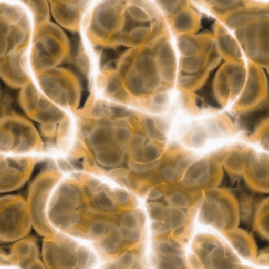Energy - King of Resources
|
|
Whether to power a nation or to power the cells of the human body, energy is an irreplaceable resource. When one runs out of energy, no other resource matters.
In regard to powering a nation, we have many fuel sources among which to choose: we can burn hydrocarbons or tap solar, wind or hydro energy. To power a human cell, we have only two options:
- We can burn fat or
- We can burn sugar.
|

|
|
This burning occurs in the mitochondria, or cellular power plants, in the presence of Oxygen, and the energy is captured as ATP.
|
|
|
|
|
Considerations Regarding Energy Resources
Ample oxygen is an absolute requirement for energy production, but will not consider its importance for now. A discussion on the paramount importance of oxygen occurs elsewhere.
Both in regard to powering nations and in regard to powering human cells, we have two key things to consider in choosing which energy resources to utilize:
- What is net gain in energy (energy/productivity gained versus energy/cost expended)?
- What are the consequences in terms of waste products?
Obviously, we want the most net energy gain and the least amount of harmful byproducts.
As an example, nuclear energy looks very good (at first)... because splitting an atom takes so very little energy in comparison to the huge amount of energy that is returned. It’s not until you look at harmful byproducts, that nuclear energy loses its appeal.
On the opposite end of the spectrum, generating power through human muscles - such as pedaling a bicycle to generate electrical energy - actually returns less energy than was consumed in pedaling the bicycle and that’s why we don’t hire people to pedal bicycles to make electricity.
Producing energy for a nation by burning hydrocarbons results in tremendous air and water pollution. Producing energy via nuclear fission produces dangerous radioactive wastes. Producing energy via harnessing of water and wind give little or no pollution, which is makes them very desirable, in spite of the minimal amounts of energy produced compared to nuclear power.
In regard to burning energy for our human body and its 100 trillion individual cells, we will discuss three categories of fuel that can be burned. These three categories are:
- The first category is sugar/glucose (this includes carbohydrates which are converted to sugar/glucose). Burning sugar/glucose for energy (except for alpha polysaccharide peptides) produces a net of two ATP molecules (38 molecule theoretical limit minus the costs of processing the sugar/glucose for energy) per molecule of sugar. Burning sugar produces substantial amounts of free radicals.
- The second category is fat. Burning fat for energy produces 11 molecules of ATP (461 molecule theoretical limit minus the costs of processing fat for energy) per molecule of fat. Burning fat produces far less free radicals than does burning sugar. This makes fat a better source of energy than sugar.
- The third category is in regard to a nanosized sugar/protein bonded molecule called alpha polysaccharide peptide. This fuel source is available only through nanotechnology. Functional sugars (beta glycans) are broken down to very tiny particles (click here to learn more about alpha polysaccharide peptides). Alpha polysaccharide peptides produce up to 36 to 38 molecules of ATP per molecule of alpha polysaccharide peptide with very little production of free radicals.
Conversion of fuel sources into ATP energy via our metabolic processes is exceedingly complex. We will simplify the matter to a few points:
- Cellular mitochondria (the cellular power plants which energy conversion or burning processes take place) are either going to be in fat burning mode or sugar burning mode (except the brain which only burns sugar). Which mode the mitochondria are in depends on instructions coming from the hypothalamus (a gland in the brain).
- The hypothalamus sends out the signal to the body as to whether to burn fat or to burn sugar based on the perceived levels of the chemical messenger leptin (essentially a reflection of fat levels in the body).
- If leptin levels are perceived to be low (below 3 nanograms per deciliter) the hypothalamus will instruct sugar burning.
- If leptin levels are perceived to be normal (above 3 nanograms per deciliter) the hypothalamus will instruct fat burning.
- Once leptin levels go very high (above 9 nanograms per deciliter) the hypothalamus will not detect the leptin and will instruct sugar burning. This is a huge paradox because when leptin levels are high there are large amounts of fat in the body, that could be burned, but these fat reserves are invisible to the brain.
- Sugar burning for energy throughout the body’s cells is a long term bad thing since it causes weight gain and glycation damage and insulin resistance leading to diabetes. Therefore, anyone who wants to maintain a health weight or live a long time or avoid chronic disease should primarily burn fat. (Learn more about fat burning as a primary means of health and longevity.)
- Cells can always burn alpha polysaccharide peptides because they have an open invitation to go into the cells and into the mitochondria. Alpha polysaccharide peptides are a modern miracle energy food. Eating alpha polysaccharide peptides is the only way to give your cells enough energy so that they conduct repair operations during waking hours. Ordinarily, cellular repair only occurs while sleeping.
Summary:
getting energy from fat and from polysaccharide peptides is the best way to go for health and longevity.
|